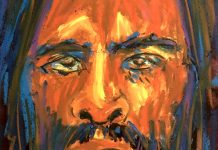Sometime during the mid-eighteenth century, a Jesuit priest in France named Jean-Pierre de Caussade wrote a book that is sometimes called Abandonment to Divine Providencebut is more popularly known in English as The Sacrament of the Present Moment. I’m going to begin this post with a quotation from that book, because its vision of the place of grace within human interconnectedness is astounding and deeply moving to me. Writing of transformed souls, Caussade said:
Everything in these solitary souls speaks to us of God. God gives their silence, quiet, oblivion and isolation, their speech and their actions a certain virtue, which, unknown to themselves, affects others. And, just as they themselves are guided by the chance actions of innumerable creatures that are unwittingly influenced by the grace of God, they, too, guide and sustain many souls with whom they have no connection and no commitment to do so. It is God acting in unexpected and often mysterious ways.
Often, when I think of interconnectedness, it is through a moral lens. I get angry at negligence and selfishness, because I think that it stems from an inability to catch glimpses of the world as its seen through God’s eyes. When I am negligent or selfish, it’s because I am willfully closing myself off from God, refusing to see the great need and hope that is present within creation at every moment in time. God, of course, can see everything, and knows our deep sorrow and deep longing. A truly Christian moral life is one in which we try to align ourselves to the divine compassion that accompanies this seeing and knowing, and then act from it as we try to alleviate suffering and care for others.
But de Caussade is expressing something different. He is saying that interconnectedness is as affected by our being as it is by our actions, that we both give grace through our very persons, and are the recipients of the profound grace given by “the chance actions of innumerable creatures.” Without knowing it, we abide in an environment of grace. Without knowing it, we contribute to that environment.
What, you may ask, does this have to do with the end of Acts, and the apostle Paul? This is my final post, my final word on Luke and Acts during the Big Read, and I find myself wanting to focus, one last time, on the transformed soul. Is Paul a transformed soul? I think that he is. That doesn’t mean that he’s free of the small self. But for the most part, maybe most particularly in quiet moments, he is part of grace’s weather system. On the ship at sea, he remains calm and compassionate, and in small ways the grace he gives sees them through the storm. When the snake bites him, he reacts quietly and without fear. And he ends his story in quietude, sitting in a prison cell, teaching and blessing the people who come to see him.
We are attracted to the dramatic, so the end of Acts can feel like an anticlimax. But I’m glad that we don’t hear the story of Paul’s execution. We are left with an image of peace, rather than an image of struggle. He is no longer arguing in synagogues or being chased around cities by angry mobs. He isn’t standing out in any particular way – the Roman Jews haven’t even heard of him. The end of his story is, indeed, unexpected. But he ends in a state of grace, visited by a few people, teaching gently, no longer a storm in himself, but a mere particulate in the atmosphere of grace, a drop of water in the sea, a spark rising from the fire. He ends like one of de Caussade’s simple souls, who “guide and sustain many souls with whom they have no connection and no commitment to do so.” There is no better ending for Luke’s story.



